by Mickie Bolling-Burke
The trees stood in the silent night, watching as the cottage door opened and children danced out, the adults laughing behind.
“All right kids, which one is our Christmas tree?” Father called out. “This one?”
“No, it’s ugly! We should put it out of its misery.” The children laughed, breaking its young branches. They ran deeper into the clearing. “Here, this one, this is our tree!”

The children shrieked with glee, counting out each cut as Father chopped down the biggest, greenest pine. When it fell, he tied a rope around it and dragged it back to the cottage. They knocked the snow off and shoved it inside as they sang Christmas carols.
The curtains stood open, showing the family nailing the dead tree onto a platform and posing it in front of the window. Showing the children hanging gaudy objects from its branches. Showing the resin tears of the dead tree clinging to its trunk. Outside, the trees whispered to each other. Their limbs pressed forward, the trees in the back pushing through to add their strength, shattering the window.
The trees crowded into the room, surrounding the family. Held tightly in the trees’ embraces, the boughs suffocated the family’s screams.
 Growing up on the east coast, Mickie kept her wrist watch at California time. When she finally made it to the palm trees and Pacific Ocean of the west coast, she knew she’d come home. Working as an actor fed her creative soul, until her beloved Los Angeles grew too big for her. She and her family now live in a small corner of the southwest, where she finds the sky as majestic and blue as she did the ocean. Mickie spends her time writing, reading, hiking and watching ‘The Three Stooges’ with her much adored rescue cat, Pal.
Growing up on the east coast, Mickie kept her wrist watch at California time. When she finally made it to the palm trees and Pacific Ocean of the west coast, she knew she’d come home. Working as an actor fed her creative soul, until her beloved Los Angeles grew too big for her. She and her family now live in a small corner of the southwest, where she finds the sky as majestic and blue as she did the ocean. Mickie spends her time writing, reading, hiking and watching ‘The Three Stooges’ with her much adored rescue cat, Pal.
Mickie has three short story collections available on Amazon.







